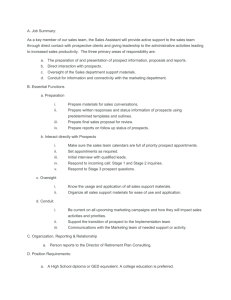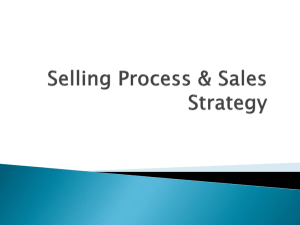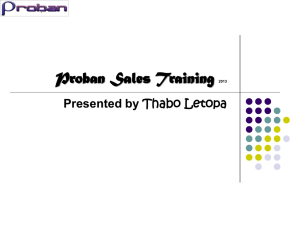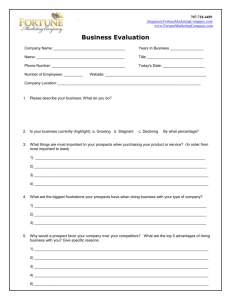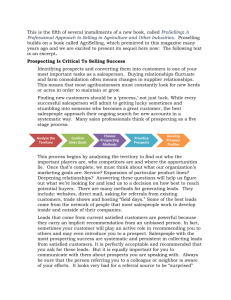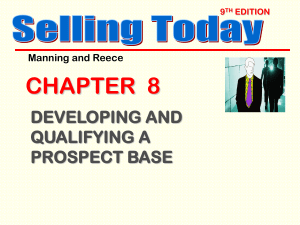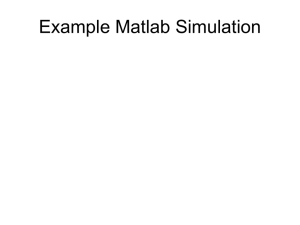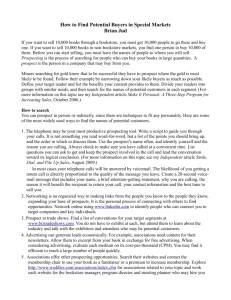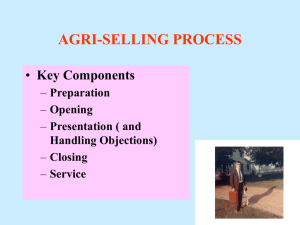Developing and Qualifying a Prospect Base
advertisement
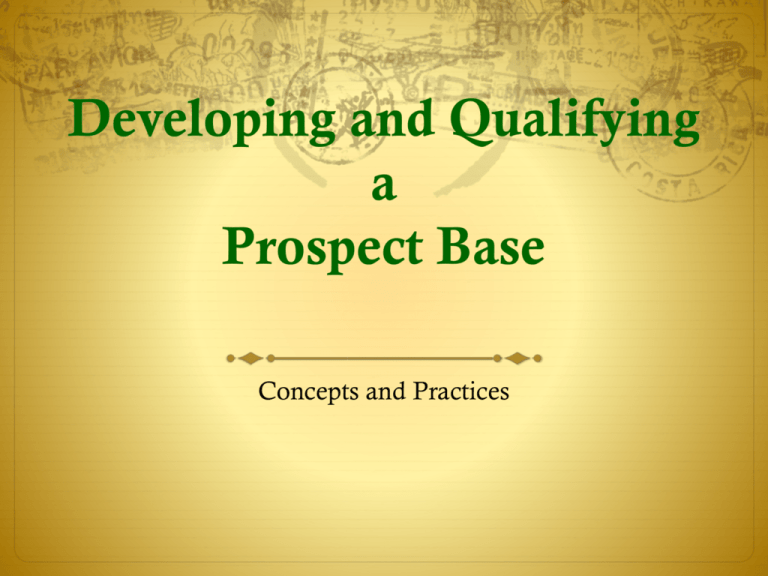
Developing and Qualifying a Prospect Base Concepts and Practices Prospect, Prospecting, and Prospect Base Defined Prospect: a potential customer that meets the qualification criteria established by your company Prospecting: identifying potential customers Prospect base: is made up of current customers and potential customers 9-2 Importance of Prospecting Every salesperson must cope with customer attrition Customers move, firms go out of business, sales lost to competition Average company may lose 15 to 20% of customer base every year 9-3 Girard’s Ferris Wheel—Supply 9-4 FIGURE 9.1 Girard’s Ferris Wheel—Loss FIGURE 9.1 9-5 CONTINUED Prospecting Requires Planning Increase number of people who board the Ferris wheel Improve the quality of prospects Shorten sales cycle by determining which prospects are “qualified” Prospecting plans must be monitored continuously for effectiveness 9-6 Referrals Prospect recommended: by current satisfied customer or one familiar with product or service Endless chain: ask contact who else could benefit from product Referral organizations: facilitate networking Friends, family members, centers of influence: a person may not make decision but has influence on those who do . . . opinion leaders 9-7 Hancock’s Lead Generation 9-8 Business Network International Visit the world’s largest referral organization www.bni.com 9-9 Directories Hundreds of business and industrial directories available Many major trade associations publish directories Be sure to use current copy or edition as prospects shift firms; track people and companies 9-10 Thomas Register 9-11 Trade Shows/Publications Trade shows and conventions: your company may have a booth at key trade shows/expositions Trade publications: each industry has trade publications that sales professionals need to read Join trade associations: many salespersons join trade associations to gain access to potential buyers 9-12 Telemarketing Telemarketing: the practice of marketing goods and services through telephone contact To identify buyers and generate contact lists for sales staff To qualify prospects To verify sales leads generated by other methods To conduct follow-ups 9-13 Direct Response and Sales Letters Direct response advertising: often features inquiry cards or information requests via mail or telephone Sales letters: send sales letters to decision makers, then follow up 9-14 Website Websites provide cost-effective way for sales professionals to: Project personal image Provide additional information Generate leads from visitors to site Present product information Establish e-mail lists 9-15 Computerized Databases In-house databases: your firm may already have a comprehensive database; sometimes referred to as the “house list” with details on customers, purchase patterns, and so forth List sources: wide range of precise lists available from variety of sources See www.infoUSA.com 9-16 Computerized Databases Purchasing databases or lists can be costly; price usually set on cost-per-thousand names Not all relevant databases are equal; some “pull” better than others Pull is the percentage of the list resulting in qualified prospects or actual sales 9-17 Cold Calling Simply calling prospects without referrals New salespeople rely on these as they haven’t built referral base Must be strategically planned Prelude to in-person appointment A way to introduce yourself and your company to a prospect 9-18 Networking Making and profiting from personal connections Networking guidelines Meet as many people as you can Tell them what you do Do not do business while networking Offer business card Edit contacts and conduct follow-ups 9-19 Three Types of Networks 9-20 FIGURE 9.2 Educational Seminars Provide opportunity to showcase product without pressuring to buy Require extensive preparation Start value-added process Can attend or present at industry sponsored seminars or offer your own 9-21 Non-Sales Employees Non-sales personnel can be valued source of leads Prospecting not necessarily exclusive task of sales force Non-sales personnel often need training and incentives 9-22 Combination Approaches Salespersons generally rely on combination of prospecting methods Some methods have higher yield than others Important to use CRM technology to help maximize efficiency 9-23 Qualifying Prospects Key time-saving criteria: Does the prospect need my product? Can prospect make the buying decision? Can prospect pay for the purchase? Will anyone close the sale? 9-24 Organizing Prospect Information Prospect as an individual Prospect as a business representative 9-25 Prospect Information Harvey Mackay suggests 66question customer profile. See it at: mackay.com 9-26 Prospecting and Sales Forecasting Plans Important to balance time and organize contacts: Prepare a list of prospects Forecast potential sales volume for each new account, by product Carefully plan the sales route to minimize time and cost 9-27
